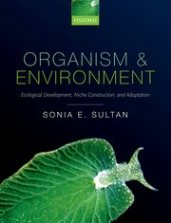Organism & Environment
 Sonia E Sultan
Sonia E Sultan
Oxford University Press, £29.99
Understanding the reciprocal relationship between organisms and their environment is critical for a host of reasons, not least for the prospects of biological communities in a world where change continues at an unprecedented rate.
The reciprocity between organisms and environment was highlighted by James Lovelock's Gaia hypothesis in the 1970s. Some 40 years later, a body of research has emerged to warrant the definition of new disciplines. Sultan describes these as ecological development biology ('eco-devo' approach) and niche construction or eco-evolutionary feedbacks. The former focuses on the influence of environment on genes and their expression, while the latter embraces the impact of organisms on environment.
Each of the seven chapters examines and synthesises a considerable body of research pertaining to these fields, and provides illustrative examples.
Topics included are the environmental context of organism development, ecological niches and niche construction, eco-devo trajectories, plasticity or the many ways that organisms influence their environment, organism-environment feedbacks, the expression of 'eco-devo' at community level, and natural selection.
The epilogue highlights directions for research. These include phenotypic expression pathways, the value of an eco-devo approach, the inclusion of niche construction into ecological and evolutionary research, applications in environmental and biomedical research, and issues concerning future adaptations.
This book brings together considerable literature on the frontiers of ecological research and contains an extensive 37-page bibliography. Thought-provoking and rich in ideas, it is particularly relevant for advanced undergraduate courses and graduate students in biology, ecology and environmental science.


